The week-long visit of Kim Jong Un to Russia couldn’t have come at a more perfect time, allowing Putin’s mouthpieces to gush over Russia’s newfound affinity for North Korea, to express admiration for the hermit kingdom, and conclude that viewers should reject “savage capitalism.”
During last week’s broadcast of The Evening With Vladimir Solovyov, political scientist Sergey Mikheyev praised Kim Jong Un as a “dude with a square head,” who is keeping the West on tenterhooks. He marveled at the way the people of North Korea were able to withstand Western pressure because they aren’t sensitive to the absence of modern luxuries and are therefore inured to sanctions.
“What can you forbid to North Koreans?” Mikheyev said. “To drink Coca-Cola? They don’t have it anyway! To watch Hollywood movies? They don’t have them anyway! You’ll turn off their Internet? They don’t have it anyway! You won’t import iPhones? They don’t have them anyway! You will forbid them to travel to Europe and America? They aren’t traveling anyway! There is no way to get to them.”
The irony of this celebration of hopeless poverty seemed lost upon the host, Vladimir Solovyov, who uses the latest version of the iPhone, had his $9m Italian properties on Lake Como seized by the authorities and complained about the sanctions-related inability to service foreign-made cars.
Presenters on Solovyov’s own channel, Solovyov Live, took the austere line of reasoning even further. The host of “Day Z”, Yulia Vityazeva, played video clips of a Russian military choir giving a concert in Pyongyang, claiming that the appearance of “clean and smiling” people in the audience disproved Western narratives about the scarcity of food. She said that on closer inspection, all the stereotypes are shattered “into a million pieces,” while admitting that Russians have habitually ignored North Korea, and acknowledged she’s never visited.
On “Karnaukhov’s Labyrinth,” host Sergey Karnaukhov called upon Russia to reject “savage capitalism” and usher in a North Korean-style asceticism, for the sake of the state. He scolded wealthy Russians for becoming accustomed to living in the lap of luxury and added: “Turns out, there are different values and a different lifestyle. North Korea preserved them and even increased them. It means we can rely on them! We can go there, look at their life, and see that what we’ve considered to be valuable in our country isn’t valuable at all.”
Karnaukhov added: “North Korea is offering its system of values! We’ve been chuckling at Juche [North Korea’s state ideology], but turns out it isn’t funny. Turns out we should laugh at ourselves! We’ve dissolved our identity in hedonism and leisure. Russia no longer exists! That’s what we have achieved. But now is our chance and all will be well.”
Even as Russia’s tightly controlled state media has been perpetuating the myth of an unscathed, booming economy, the cracks are showing. Prominent propagandists now regularly acknowledge that things are difficult and prices are on the rise. Videos of everyday Russians periodically posted on social media recognize that price increases and high-interest rates leave them unable to afford much more than the bare necessities.
In one of the street interviews posted on Telegram by a popular user @slvn_pomet, an unidentified woman advised all poor Russians to simply “eat less and then everything will be alright.”
However, at least one leading propagandist saw the problem with this thinking. On September 18, Sergey Mardan, the host of “Mardan” on the Solovyov Live channel, attempted to raise the alarm over a potential repeat of what happened in the Soviet Union.
The host asserted that Russia can be destroyed by its internal problems: “What can fuel this discontent? Economic problems, poverty, hunger, currency depreciation, inflation.” Mardan recalled the 1980s when the Soviet people suffered chronic food shortages. He added: “The problems with food existed all the way until the dissolution of the Soviet Union. They varied from region to region, but always existed.”
He concluded that this failure to meet even the most basic needs created a widespread feeling of discomfort and said: “I think this contributed to the end of the Soviet Union more than the CIA, Mossad, BND, MI6, and the rest of the global intelligence services put together.”
And yet the Kremlin is unable to contain the worsening situation and is tightening its grip, determined to contain the blowback.
The media’s celebration of North Korea paints a grotesque portrait of the future that might lie ahead for the average citizen. Of course, this dreary vision would certainly exclude Putin and his clique of oligarchs and cronies, including the propagandists. For the common people, the future looks rather less cheery.
Julia Davis is a columnist for The Daily Beast and the creator of the Russian Media Monitor. She is a member of the Academy of Television Arts and Sciences, the Screen Actors Guild, and Women In Film.
Europe’s Edge is CEPA’s online journal covering critical topics on the foreign policy docket across Europe and North America. All opinions are those of the author and do not necessarily represent the position or views of the institutions they represent or the Center for European Policy Analysis.





